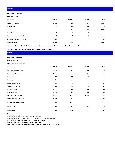





We use Altman's Z Score as our measurement tool to assess a company's financial condition. It incorporates fundamental financial analysis, offers a consistent measurement methodology across all business segments, and an enhanced level of transparency by use of fully disclosed and open calculation model.
Z Score Advantages
The Z Score provides a quantitative measurement of a company's financial health. The Z Score highlights factors contributing to a company's financial health and uncovers emerging trends that indicate improvements or deterioration in financial condition.
The Z Score is a critical tool business managers use to assess financial health. It helps managers align business strategies with capital allocation decisions and provide transparency of financial condition to lenders and equity capital providers. Business managers use the Z Score to offer evidence of financial stability to raise capital and secure credit.
The Z Score is an effective tool to demonstrate credit worthiness to bankers and soundness of business model to investors. The Z Score is based on actual financial information derived from the operating performance of the business enterprise. It avoids biases of subjective assessments, conflicts of interest, brand and large company bias.
The Z Score employs no theoretical assumptions or market inputs external to the company's financial statements. This provides users of the Z Score with a consistent view and understanding of a company's true financial health.
The Z
Score is a valuable management tool to assess the financial
condition of the company's balance sheet, uncover factors that are
stressing the balance sheet and initiate actions to improve the
financial wellness and credit worthiness of the firm. All business
decisions and actions are ultimately revealed in the company's balance
sheet.
The Z Score measures the effectiveness of business decisions.
It empowers managers to anticipate changes occurring in credit
worthiness and proactively manage changes in the firms financial condition.
Armed
with a tool to calculate future financial positions, managers have the
latitude to better manage outstanding receivables, improve liquidity and
lower their cost of capital. Calls for capital, negotiations for
funding or decisions in setting credit policy can now be made from a
knowledgeable position with a set of supporting facts.
The Z
Score gives business managers an important negotiating tool to defend
their credit rating during capital raises when excess leverage or
deficient levels of working capital and equity are present.
Sample Report and Input Template
Sum2, LLC
PO Box 665
Oakland, NJ 07436
973.287.7535
customer.service@sum2.com
© 2002-2013 Sum2 LLC, All
Rights Reserved
